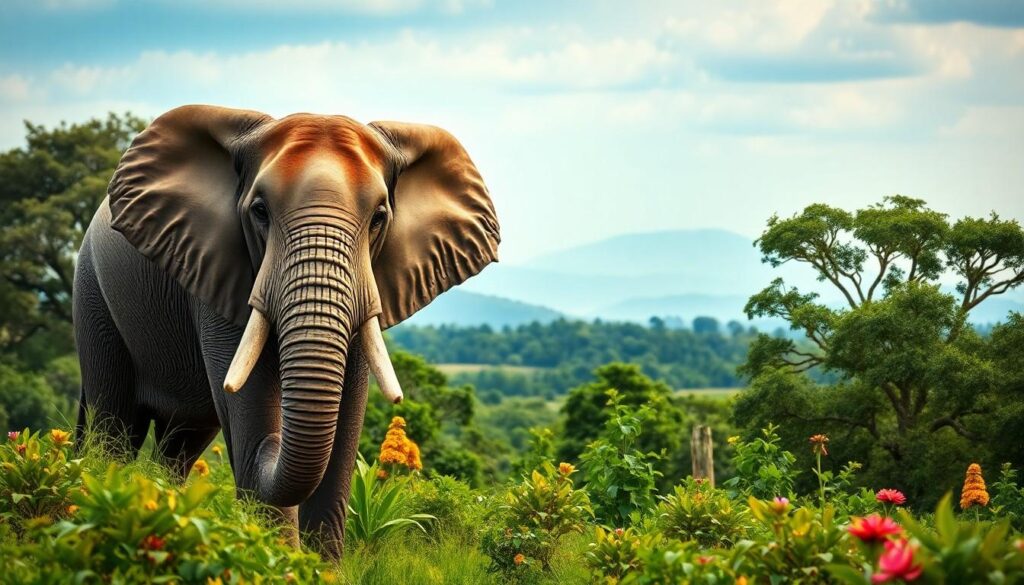Choosing the perfect name for an elephant isn’t just about picking something cute—it’s about capturing the spirit and personality of one of the industry’s most majestic animals. Whether we’re naming a beloved zoo resident or dreaming up a character for a story, the right name can spark connection and wonder.
We all know elephants are unforgettable, so their names should be too. Let’s jump into the art of finding a name that stands out, resonates with meaning, and leaves a lasting impression. With the right inspiration, we can make any elephant’s name as legendary as the animal itself.
Exploring the History Behind the Name of an Elephant
Let’s look at how the tradition of elephant naming shapes our connection to these creatures and explore famous examples that left their mark.
Understanding Traditional Elephant Naming Customs
People in different cultures use unique customs to name elephants. Families in India often pick names that bring good luck or show devotion to gods, especially Ganesha. Our friends in Thailand prefer names reflecting strength or beauty, usually inspired by nature or royal titles. In Africa, we find communities choosing names based on distinctive traits, such as large ears or rare coloration. Caretakers and trainers worldwide build trust using these traditional names, creating lifelong bonds with each elephant.
Tracing Famous Elephants and Their Names Through History
Names of legendary elephants can spread wonder and spark imaginations across generations. Jumbo, who starred in 19th-century circuses, became a global icon—his name now describes anything gigantic. We remember Hanno, the Indian elephant gifted to Pope Leo X in 1514, who appeared in paintings and stories. Tyke, who made headlines in the 1990s, brought attention to animal rights for elephants in captivity. These famous names fuel conversations and deepen our fascination with these magnificent animals.
Highlighting Famous Names of Elephants in Literature and Pop Culture

When we look at stories that have shaped our childhoods and imaginations, elephant characters stand out with their timeless charm. These names still spark wonder and nostalgia every time we hear them.
Notable Fictional Elephant Names in Books and Movies
Babar often comes to mind first when we think about elephants in literature. He reigns as the gentle, wise king in Jean de Brunhoff’s classic children’s series, teaching important lessons about kindness and leadership. Elmer the Patchwork Elephant brings a colorful twist—literally—to our bookshelves. David McKee introduced Elmer’s bright, patchwork hide in 1989, and every story shows how being different really is something to celebrate. We can’t forget Dumbo from Disney’s 1941 film either. Audiences everywhere cheered for Dumbo as he soared to fame with those famously giant ears and a heart just as big.
Iconic Elephants in Cartoons and Animation
Disney gave us even more memorable elephants. Tantor stampedes through Tarzan’s adventures, loyal and sometimes a little nervous, but always reliable. Colonel Hathi leads his herd with pomp and pride in The Jungle Book, delivering discipline and comic relief in equal measure. Shep from George of the Jungle flips expectations by acting more like a lovable dog than a traditional elephant, adding plenty of laughs. Snorky grooves onto the scene in The Banana Splits Adventure Hour, easily spotted as the quirky elephant member of the musical gang. Mr. Snuffleupagus, a gentle giant on Sesame Street, is often mistaken for an elephant with his long trunk and fluff, and he’s loved for his soft-spoken wisdom. Horton, the caring hero of Dr. Seuss’s Horton Hears a Who!, reminds us all that “a person’s a person, no matter how small.”
Each of these characters brings a unique personality to their stories, making their elephant names unforgettable in literature and pop culture.
Explaining the Cultural Significance of Naming an Elephant

Naming an elephant isn’t just about giving it a label—it’s about honoring tradition, wisdom, and the deep connections we share with these incredible animals. In every culture where elephants play a role, names carry layers of meaning and respect.
Elephant Names in Religious and Spiritual Traditions
We find that elephants carry spiritual weight in many African societies. Some believe their chiefs become elephants in the afterlife, which is why Igbo-Ukwu people in 10th-century Nigeria buried their leaders with elephant tusks. Groups connect the elephant not only with their rulers but also with symbols of wisdom and endless memory, like in the Kingdom of Dahomey, where elephants represented enduring royal legacies. No fixed religious rituals focus on naming elephants, but the animals themselves are seen as spiritual beings—living symbols of stamina, mental strength, and mystical power.
Meaning Behind Common Elephant Names in Different Regions
Even today, names often spotlight an elephant’s most admired qualities. Some cultures pick names such as “Strength” or “Wisdom,” echoing the traits people value most in these giants. Conservation areas and zoos tend to choose names inspired by an elephant’s birthplace or its unique personality, but these choices usually skip past traditional roots. While Indian and Thai traditions may select names that hint at good fortune or beauty, the African approach is sometimes more straightforward, with names reflecting notable physical features or behaviors. This pattern in naming highlights the ways we attach both cultural honor and affection to elephants, everywhere they’re known.
Discovering Popular Methods to Name an Elephant

When we’re thinking about what to call an elephant, it feels like there are endless directions to explore. Let’s walk through the two main ways we often come across—the deep-rooted traditions and the latest innovations—so we can see what really stands out.
Traditional and Symbolic Naming Practices
Cultural customs have shaped the way names are chosen for elephants across the industry. In India, we might see families picking names that carry wishes for luck or devotion, like “Ganesha” or “Lakshmi,” often inspired by legends and deities. Names in Thailand sometimes show off strength or beauty, so words like “Chang” or “Bua” might pop up to honor those traits. African naming customs usually pull from an elephant’s most noticeable features—so an elephant with big ears could be called “Mapasa” (“ears” in Swahili). These traditions don’t just hand out names at random; they connect us to the animal’s personality, its symbolic meaning, or its place in nature and history. Each time we use one of these names, we keep stories, beliefs, and a sense of respect alive.
Modern Approaches and Creative Naming Trends
Nowadays, we often get creative when it comes to naming elephants, especially with the help of technology and fresh perspectives. Conservationists and researchers, for example, don’t just rely on their instincts—they use modern tools to distinguish individuals. Research teams can use powerful microphones to record vocalizations that, according to Colorado State University studies, actually serve as natural “names” among elephants, letting each one address another directly through unique infrasonic contact rumbles. While some zoos and sanctuaries crowdsource names, inviting the public to join in with fun contests (think “Ellie,” “Jumbo,” or even “Thunder”), we’re seeing modern naming become a way to engage and educate. Still, scientific communities aren’t inventing names so much as they’re decoding the ones elephants use themselves, focusing on authentic communication over catchy labels. With machine learning analyzing hundreds of recorded calls, we’ve learned that elephants in the wild truly label each other by sound, something far more meaningful than any human-made trend.
Showcasing Fun and Unique Elephant Names Around the World

Let’s look at some of the most entertaining and distinctive elephant names you’ll find in zoos and conservation projects. These choices showcase the playful, memorable, and sometimes truly unique ways we connect with elephants globally.
Amusing and Memorable Names for Zoo Elephants
Zoo elephants often carry names that are both fun and instantly recognizable. Daisy, famous for her circus performances, has delighted audiences for decades. Another unforgettable name, Topsy, became widely known after the controversial 1903 incident involving electricity. Flora stands out as the respected matriarch of Auckland Zoo’s herd, known for her gentle leadership. Kesavan is celebrated in Kerala, India, as a revered temple elephant who inspires local traditions. Some names, like Lumpy from Winnie the Pooh, bring a touch of whimsy and storybook charm. Many zoos have chosen Nellie or Nelly for their elephants, offering a classic and approachable feel.
Names of Wild Elephants in Conservation Projects
Wild elephants in conservation areas display a different approach to naming. Every elephant calls others by personalized names, according to studies published in Nature Ecology and Evolution. Rather than assigning human-chosen names, these elephants use unique vocal signatures that work much like our own naming system. Conservation teams will sometimes adopt these natural identifiers, highlighting the deep intelligence—and individuality—found in elephant communities. For public-facing projects, organizations may still use classic or descriptive names for educational outreach, but the elephants themselves always lead the way in naming each other within the herd.
Offering Tips for Choosing the Perfect Name of an Elephant

Let’s make naming an elephant an enjoyable process that celebrates its uniqueness. When we choose thoughtfully, the right name can honor the animal’s essence and create a lasting bond.
Considering Personality and Physical Traits
Every elephant brings its own personality to the herd. Sometimes, we spot an elephant with a playful spark—names like “Silly” or “Pixie” capture that fun energy. Other times, a bold or adventurous elephant urges us toward names such as “Rogue.” Physical features also offer inspiration, so if we see a chocolate-toned calf, “Choco” or “Cocoa” fits perfectly. A fuzzy newborn might inspire us to pick “Fluff.” Matching a name to the elephant’s unique look or behavior not only adds meaning but also makes the name a vivid reflection of who they are.
Seeking Inspiration from Languages and Mythology
We find rich sources of names in languages and mythology. Sometimes, Swahili names like “Kibo,” meaning “gift,” or “Nala,” meaning “success,” feel just right. Other times, we look to stories from around the industry. Mythological names such as “Phoenix” feel perfect for elephants with a resilient streak, while “Echo” nods to ancient Greek tales and suits those that always answer a call. English folklore and whimsical traditions can inspire fun picks like “Tinker.” Mixing language and legend opens up a wide industry of options, helping us choose names that are both meaningful and unique.
Conclusion
Choosing a name for an elephant is a creative journey that lets us celebrate their individuality and the deep bonds we share with them. Every name carries a story—one that honors tradition, personality, and the remarkable qualities elephants embody.
As we continue to name and connect with these gentle giants, let’s remember the power a name holds. Whether inspired by culture, history, or the elephant’s own unique traits, the right name helps us foster respect and admiration for these incredible animals.
Frequently Asked Questions
Why is choosing the right name for an elephant important?
Selecting the perfect elephant name helps capture the animal’s spirit and personality, fosters a deeper connection, and can spark wonder. It also honors tradition and can highlight the elephant’s cultural or historical significance.
How do different cultures name elephants?
Cultures use various traditions: Indian families may choose names symbolizing luck or devotion, Thai names often represent strength or beauty, and African names frequently reflect distinctive physical traits or admired qualities.
What are some famous elephant names in history and pop culture?
Notable names include Jumbo, Hanno, and Tyke. In fiction, well-known elephants are Babar, Elmer, Dumbo, Tantor (Tarzan), Colonel Hathi (The Jungle Book), and Horton (Horton Hears a Who!).
How do conservationists and zoos name elephants today?
Zoos and conservationists often consider the elephant’s personality, birth location, or unique traits. They might also use naming contests or vocalizations, blending tradition with creativity for meaningful names.
What are examples of playful or unique elephant names?
Popular playful names include Daisy, Topsy, Flora, Kesavan, Silly, Pixie, Choco, and Cocoa. These names reflect the elephants’ personalities, colors, or quirky characteristics.
Do wild elephants have their own way of naming each other?
Yes, in the wild, elephants use unique vocal signatures to identify one another. These natural “names” help them recognize individuals within their herds, showcasing their intelligence and social bonds.
What tips can help in choosing the perfect elephant name?
Consider the elephant’s personality, appearance, and unique traits. Draw inspiration from world languages, mythology, and culture. Choose a name that is meaningful, easy to remember, and reflects the elephant’s individuality.







